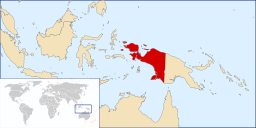United Nations Temporary Executive Authority
| West New Guinea (West Irian) | ||||||
| United Nations protectorate | ||||||
| ||||||
| ||||||
 Location of West New Guinea in Southeast Asia. | ||||||
| Capital | Kotabaru | |||||
| Languages | Dutch Papuan languages Austronesian languages | |||||
| Political structure | Protectorate | |||||
| Administrator | ||||||
| • | 1962–1963 | Djalal Abdoh | ||||
| Historical era | Cold War | |||||
| • | Established | 1 October 1962 | ||||
| • | Disestablished | 1 May 1963 | ||||
| Area | 420,540 km² (162,371 sq mi) | |||||
| Currency | Netherlands New Guinean gulden | |||||
The United Nations Temporary Executive Authority (UNTEA) / United Nations Security Force in West New Guinea (UNSF) was established during October 1962 in accord with Article two of the New York Agreement to administer the colony of West New Guinea until 1 May 1963.
History
Western New Guinea became the focus of a political dispute between the Netherlands and Indonesia following the recognition of the independence of the latter. The Indonesian side claimed the territory as its own while the Dutch side maintained that its residents were not Indonesian and that the Netherlands would continue to administer the territory until it was capable of self-determination.
Indonesia landed paratroops onto the territory of Western New Guinea in 1961 which prompted a political crisis between the Netherlands and Indonesia. The United Nations attempted to mediate in the dispute and this led to the signing of the New York Agreement in September 1962.
The agreement stipulated that the administration would pass from the Netherlands to a United Nations temporary authority on 1 October 1962 which would then transfer administration of the territory to Indonesia on 1 May the following year. The agreement also stated that the people of Western New Guinea would be able to participate in an Act of Free Choice at a later stage to determine the permanent status of the territory.
The United Nations mission (UNTEA) was initially led by José Rolz-Bennett of Guatemala and then by Djalal Abdoh of Iran who served as the Administrator. In addition to civil administration, UNTEA also had a peacekeeping role through military observers.
Nineteen postage stamps, as well as some postal stationery items, were issued by UNTEA. These were created by overprinting existing stocks of Netherlands New Guinea issues.[1] At the time packets of all stamps were sold at UN Headquarters by the United Nations Postal Administration and they remain readily available on the retail market.
During the seven month transition period Dutch civil servants and officials were slowly recalled to the Netherlands and were replaced by local and Indonesian officials. It was agreed that following the transfer of authority, E. J. Bonay a member of the New Guinea Council would be appointed as the first Indonesian Governor.
The transfer of authority took place on 1 May 1963 and West New Guinea became a province of Indonesia known as Irian Barat, later renamed Irian Jaya.
This was the first time in its history that the United Nations assumed direct administrative responsibility for a territory. The United Nations would go on to undertake similar missions in Cambodia (UNTAC), Croatia (UNTAES), Kosovo (UNMIK) and East Timor (UNTAET).
UN Administrators
| Administrator | Nationality | Term of office |
|---|---|---|
| José Rolz-Bennett | Guatemala | 1 October 1962 – 15 November 1962 (acting) |
| Jalal Abde | Iran | 15 November 1962 – 1 May 1963 |
References
External links
- United Nations - West New Guinea UNSF
- Time Magazine October/1962
- Papuan self-determination - historical roots XI
- Papuan self-determination - historical roots XII
- UNTEA and UNRWI: United Nations Involvement in West New Guinea During the 1960s

